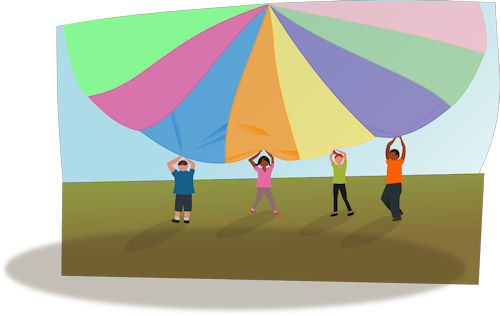Playing Together Helps Children Develop

 Socialising skills do not always come naturally to children. In fact, most children need to learn at least some social skills while growing up and some of the basic work needs to start at preschool.
Socialising skills do not always come naturally to children. In fact, most children need to learn at least some social skills while growing up and some of the basic work needs to start at preschool.
Research has demonstrated the positive impact good social skills have on a child’s future. Not only are they more likely to be able to deal with inter-personal conflicts, but they can also be more academic and resilient.
This can often mean that they are more employable and will earn more in their lives.
Not A Natural Progression
One of the common assumptions is that social skills are going to be picked up over time. However, this is not always the case. Some children need regular instruction and guidance, while others will excel in some areas but struggle with others.
One of the barriers to developing social skills is not being able to relax. Some will naturally be comfortable in group settings; they could have large families or just like the group setting. Others will hate being in large groups or even in small groups.
One of the simplest ways you can overcome the latter is to have more outdoor play. Indoor settings might make them feel claustrophobic with walls limiting the space. Outdoor spaces give an impression to the child that there is more space available so they become relaxed and more themselves, giving them the positive emotions to join in more activities.
The outside environment is also more exciting and tends to be a better learning environment.
Outside Activities And Team Work
 There are many ways you can create great activities outside to encourage teamwork and social skill development. Creating team games where the children solve a problem by working together, or playing the parachute game are excellent for encouraging teamwork.
There are many ways you can create great activities outside to encourage teamwork and social skill development. Creating team games where the children solve a problem by working together, or playing the parachute game are excellent for encouraging teamwork.
However, not all social skills need planned activities to be developed. In fact, you should encourage children to join in the imaginary games that their peers are playing.
Alternatively, asking children to help with work in the outdoor space can be a good learning platform. Tasks could include planting flowers, sweeping, or clearing up the toys. Encourage the children to work on these tasks with a partner, or in a small group, to develop co-ordination and communication skills.
Empathy Lessons
Another important area of social development is empathy. Children don’t always learn empathy easily, especially when they fight over a toy they want, but there are several tricks you can try to help them learn; including:
- Praise empathetic behaviour – be specific on what behaviour you are praising and why.
- Encourage talk about feelings – discuss what you child is feeling and why they are feeling it.
- Encourage conflict resolution through conversation – when there is a conflict between two children, sit them down and talk about the issue. Get them to discuss their feelings and explain their behaviours.
- Label feelings – ensure your children understand their feelings and can identify them. Have discussions about them and what behaviours they might exhibit when feeling them.
- Do team exercises – ensure you add in some team exercises, so children have an opportunity to solve problems together.
Children Learn Better Outside
Social skills are important for long-term success. However, they don’t always develop naturally.
While social skills can be taught indoors, outdoor lessons should be encouraged as they can speed up social skill development.
How do you teach social skills? Do you utilise your outdoor space?
Let us know in the comments below.
Able Canopies Ltd. design, manufacture and install canopies and shade structures at schools, nurseries and commercial organisations across the UK.
For more information call 0800 389 9072, email sales@ablecanopies.co.uk
Follow us on our social media accounts for the latest funding advice, new products & latest news:
Twitter | Facebook | Google + | Linked In
Categories
- Canopies for Architects & Contractors
- Canopies for Healthcare
- Canopies for Restaurants, Bars and Hotels
- Canopies for Retail & Commercial
- Canopies for Schools
- Canopies for Sports & Leisure
- Canopy Maintenance
- Case Studies
- Cool Links & Facts
- Cycle Parking Solutions
- Dates for Your Diary
- Eco-Friendly Holiday Crafts
- Employee Spotlight
- Environmental Tips
- Funding and Fundraising
- How to... Get the Most out of Your Canopy
- Latest News
- Latest Stories
- Lockdown Outdoor Learning & Play Ideas
- MD News
- Newsletters - Architects & Contractors
- Newsletters - Schools & EYFS
- Outdoor Learning
- Outdoor Play
- Planning Your Cycle Parking
- Product Focus
- Solar Carports
- Spring Fundraisers 2017
- Summer Shade
- The Good Canopy Guide
- Wall Mounted Canopies











